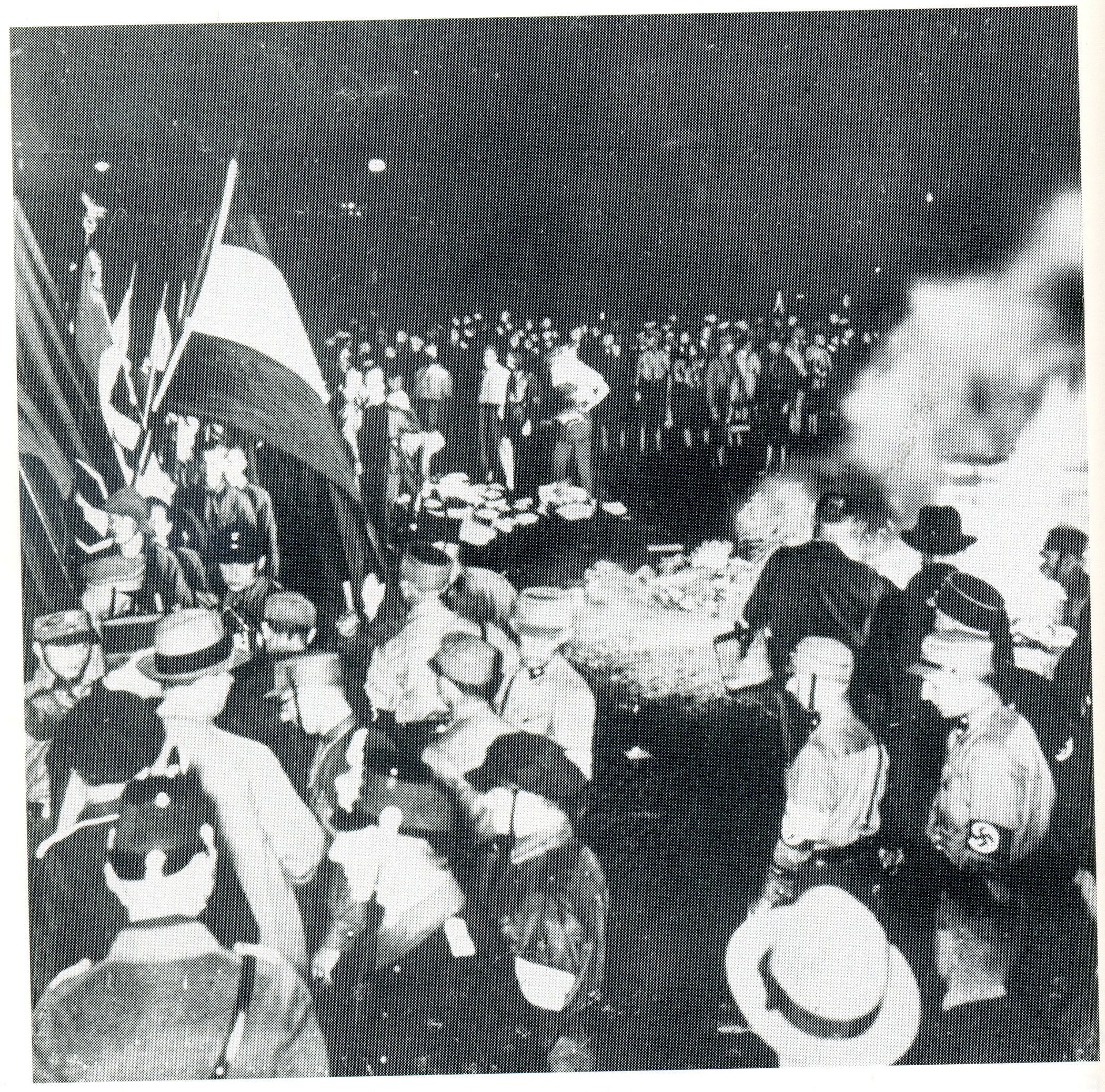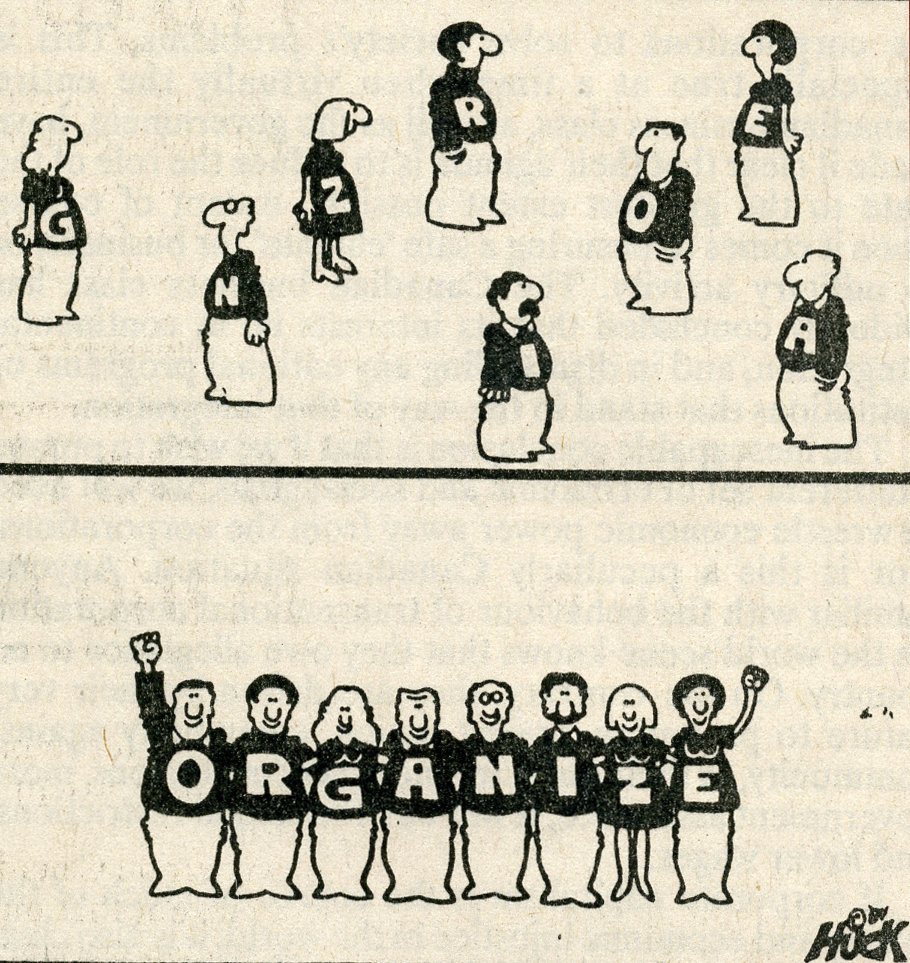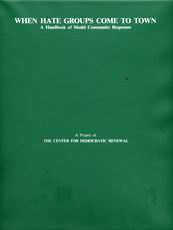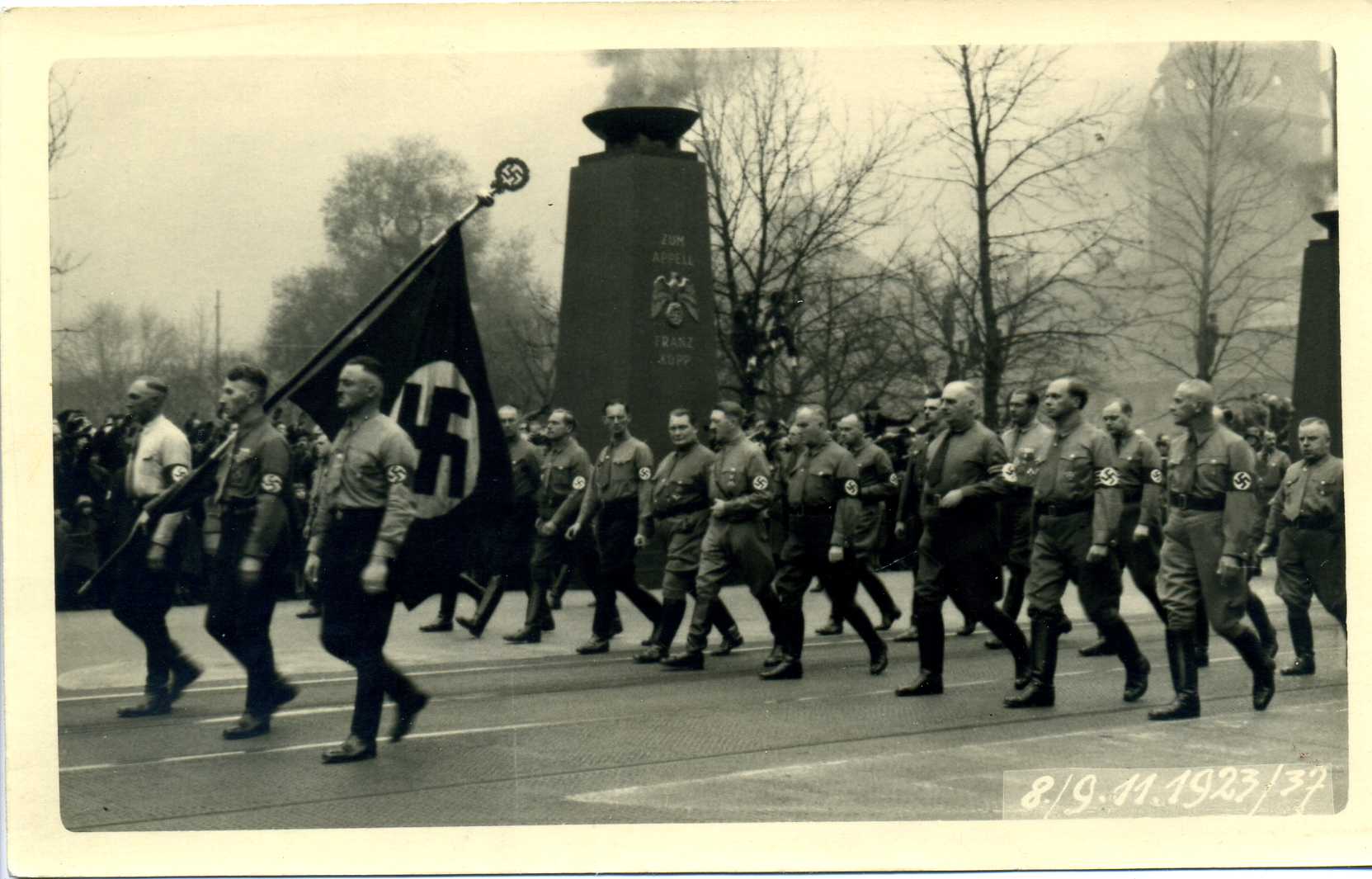Other Voices: The Connexions Newsletter
October 9, 2017
This Issue: Meeting the Challenge of the Right
When we talk about the Right, it is well to keep in mind that “the Right” is by no means a unified political force or organization, but rather a label used to describe a disparate collection of ideologies, parties, groups, and individuals.
Many of the mainstream political parties which hold government office or form the official opposition in countries such as Germany, Britain, Denmark, the Netherlands, and Canada carry the label ‘conservative,’ meaning that they are on the right of their country’s political spectrum. In most of these countries, little distinguishes these parties from the mainstream parties to their left. If the programs of the conservative parties typically call for austerity and cutbacks in public spending, coupled with more tax breaks for the rich, the programs of their more ‘progressive’ opponents will tend to call for a little bit less austerity and slightly smaller tax breaks for the rich. These parties have been following the same neo-liberal template for decades, and as the failure of neo-liberalism to improve the lives of anyone except the wealthy has become increasingly apparent, they have steadily lost support.
The hegemony of the virtually indistinguishable mainstream parties has been challenged by the emergence of hard-right parties in places such as India, Ukraine, Hungary and Poland (countries where they hold power), in France, where the National Front has become a major political force, and in Germany, where the anti-immigrant AfD finished in third place in the recent national election. With millions of people unemployed or working in marginal precarious jobs, desperation and hopelessness is leading some to listen to right-wing demagogues who offer scapegoats – usually immigrants or other minorities – or who divert their attention to social ‘evils’ such as abortion, homosexuality, and sex education. These far-right parties in fact have no real solutions to offer, but they pose a very real danger to those they target as scapegoats.
Further still to the right are a wide variety of groups and movements that openly flaunt racist and Nazi symbols and rhetoric. These groups and individuals, who have been given the name ‘alt-right’ in the United States, are by no means united, and their numbers are small, but they have shown that they are quite capable of committing serious acts of violence against those they hate. They have been challenged by anti-fascists who work to stop fascists in their tracks whenever they seek to march in the streets.
The strategy and tactics of meeting the challenge of the right are naturally subjects of debate. Those activists who identify with the label ‘anti-fa’ tend to focus their energies on trying to stop fascists from marching. Important as this is, it can also serve to divert energies from the important organizing that needs to be done. The real problem, arguably, is that the right – the more mainstream right as well as the fascists -- has succeeded in attracting support among the broader population because they are putting their energies into grassroots political organizing, while much of the left has given up on organizing, or even talking to, ordinary working people.
The emphasis on fascist fringe groups also can lead to ignoring the most dangerous anti-democratic forces. The greatest totalitarian threat comes, not from small fringe groups, but from the state’s security apparatus itself: the police and the myriad agencies that monitor and record everything that we say and do. They are the ones who driving the push to ever-increasing police militarization, surveillance, and restrictions on civil liberties in the name of ‘anti-terrorism.’
This issue of Other Voices offers a number of articles, books, and films offering different perspectives on meeting the challenge of the right. The Connexions website features many more resources and points of view: we invite you to explore them.
As always, we invite you to share this newsletter with your friends. You can forward this email, or send them the link to the Other Voices home page on the Connexions website at www.connexions.org/Media/CxNewsletter.htm.
If you'd like to subscribe and receive this newsletter by email every three weeks, please use this form.
Your feedback is appreciated - and so are donations to keep us doing what we're doing!

Topic of the Week
The Right
The general heading of “The Right” encompasses a wide range of ideologies, groups, movements, and political parties. On these pages on the Connexions website, you’ll find information about the alt-right, fascists, neo-Nazis, the Ku Klux Klan, anti-Semites, white supremacists, Hindu fundamentalists, right-wing think tanks, and right-wing movements in Canada, the United States, Ukraine, Greece, France, Germany, Israel, Venezuela, India, Pakistan, Sweden, and Britain. Explore this ugly world here. For positive ideas about combating the right, check out Anti-Fascism, Anti-Racism, and Strategies for Social Change.
This Week on Connexions.org
Who Are the 'Alt-Right'? On the Rise of Reactionary Hatred and How to Fight It
Combating hatred can be done, and must be prioritized. But we won’t begin to roll back the problem of white supremacy in the United States, says Anthony DiMaggio, until we recognize the causes of this hatred. There is much talk about actively combating far-right protesters in the streets via violent and non-violent methods. But it will take a lot more than street fights to address the mounting problem of American fascism. It will take an organized, concerted effort on the part of the masses of Americans to pressure government to reverse the economic trends that are fueling the rise of the reactionary right to national prominence. Read more
Liberals and Ultra-leftists: A Marriage Made in Hell
Janet Contursi argues that the real danger we face lies not on the far-right, but in the threat of a police state. She says: “It’s not the Nazis legally marching down main street that will sabotage U.S. democracy, but the paramilitary police state that will crush all legitimate dissent. Ultra-left violence plays into what apologists for police militarization have been saying all along -- that the police have to keep ahead of the increasing violence in the streets with updated weapons and paramilitary training. Ultra-left violence, far from stopping fascism, enables it. It makes martyrs of the right and helps white supremacists recruit more angry right wingers to their cause, just as every wedding party the U.S. bombs in the Middle East recruits angry family members to the jihadis. With every violent clash between ultra-left and ultra-right, the militarized police will grow stronger … and they’ve got minorities and peace activists in their sights. Read more
Keywords: Police State - Ultra-Left
The story of Charlottesville was written in blood in Ukraine
Some of the neo-Nazis President Obama helped put in power in Ukraine in February 2014 carried Confederate flags. U.S. society has been moving rightward for decades -- and pulling much of Europe with it. In this article, Ajamu Baraka says that “What I find interesting, about the current discussion around what many are referring to as the emboldening of the radical white supremacist right is how easy it is to mobilize opposition against the crude and overt white supremacists we saw in Charlottesville. So easy, in fact, that it’s really a distraction from the more difficult and dangerous work that needs to be done to confront the real right-wing power brokers.” Read more
Keywords: Ukraine - White Supremacy
Counter Mobilization: An Effective Response to Right Wing Speech
Civil liberties are more important to the working majority than the ruling elites. When democratic rights are attacked, it is always the working class and progressive movements for social change that bear the brunt and suffer the most. For this reason, we must guard against giving the authorities any excuse to restrict our rights. Frustrated radicals and ultra-left activists make a similar mistake. They too have given up on organizing masses of people. Instead, they substitute their own sensational, often violent confrontations for the mobilization of the 99% as a whole. Like liberals, ultra-left radicals hope to shock and shame the corporate establishment into making reforms. But an effective movement is not one that is overly concerned with changing the minds of those at the top; it is one that reaches out to those at the bottom. Read more
Keywords: Free Speech - Hate Speech
Website of the Week
Political Research Associates
Political Research Associates (PRA) produces investigative research and analysis on the U.S. Right to support social justice advocates and defend human rights. PRA studies the entire spectrum of the U.S. Right - secular, religious, economic, and xenophobic - including its influence both domestically and overseas. It works to help journalists, advocates, educators, scholars, and the public to understand and challenge the right-wing. PRA produces investigative reports, articles, and activist resource kits; publishes the quarterly magazine The Public Eye; advises policy makers and social justice advocates; and offers expert commentary for media outlets. Our core issue areas span reproductive justice, LGBTQ rights, racial/immigrant justice, civil liberties, and economic justice. Find them here
Books of the Week
American Fascists
By Chris Hedges
Hedges examines the Christian Right's origins, its driving motivation and its dark ideological underpinnings, with interviews and coverage of events such as pro-life rallies and weeklong classes on conversion techniques. Hedges argues that the movement resembles the young fascist movements in Italy and Germany in the 1920s and 1930s, movements that often masked the full extent of their drive for totalitarianism and were willing to make concessions until they achieved unrivaled power. He challenges the Christian Right's religious legitimacy and argues that at its core it is a mass movement fuelled by unbridled nationalism and a hatred for the open society. Read more
Keywords: Christian Right - Culture Wars
The Struggle Against Fascism in Germany
By Leon Trotsky
A collection of Trotsky's writings on the situation in Germany from 1930 to 1940. From 1930 on Trotsky sounded the alarm about the rise of fascism in Germany, and warned that the policies of the Communist Party and the Social Democrats were likely to lead to disaster. He urged a common front, mobilizing the German working class regardless of party affiliation, against the Nazis. Read more
Keywords: Anti-Fascism - Nazi History
Film of the Week
Israel's New Racism: The Persecution of African Migrants in the Holy Land
About 60,000 African migrants have arrived in Israel since 2006, fleeing unrest in their home countries. But upon arrival in the ostensibly democratic country, the migrants have faced intense persecution and have been branded as "infiltrators" by right-wing politicians and activists. Watch the film here
Keywords: Discrimination - Israeli Apartheid
Organizing
Talking Back to the Right: A guide for community activists
The right's enormous success in framing public debate is based not just on isolated issues, but on in overall definition of what the debate is about. The purpose of this guide is to suggest ways that progressive community-based advocacy groups can reframe the right's definition of the debate-ways that can connect with deeply-held values and understandings of the American people. It is designed to help advocates frame their views for the media, develop educational programs and materials for their constituents, and talk to their fellow citizens in meetings and informal discussions. Read more
Keywords: Framing Issues - Strategies for Social Change
When Hate Groups Come to Town: A Handbook of Model Community Responses
A handbook for dealing with hate groups in communities, with analysis about with the nature of such groups and how they work, and outlining strategies for how communities can band together to combat them. Perhaps the most valuable section of this handbook is the collection of case studies that show how specific communities have dealt with countering hateful organizations. Read more
Keywords: Anti-Racism - Hate
People's History
Could Punching Nazis Have Prevented Hitler From Taking Power
There have been repeated references, write Louis Proyect, to how Nazism could have been stopped by street-fighting, with almost no attention paid to the concrete socio-political conditions of Germany between 1920 and 1933. For many of those who think that physical force was the key to stopping Nazism, the viral video of Richard Spencer getting punched in the face was far more important as a guide to action than understanding the tragic history of the German left. Proyect, on the other hand, argues that the most important lesson to be learned from the Nazi seizure of power was that the left was tragically split, and was unable to unite even in the face of the existential threat posed by fascism. Read more
Keywords: Anti-Fascism - Strategies for Social Change
From the Archives
The Secret of Hitler's Victory
By Peter and Irma Petroff, 1934
After the Nazi seizure of power in Germany in 1933, Peter and Irma Petroff fled Germany to live in exile. The Nazis seized their library and the materials they had gathered documenting the rise of Nazism, but the Petroffs nonetheless managed to write a powerful analysis of how the Nazis were able to gain power. The book is available online in digital format here
Connexions Calendar
October 11, 2017
International Day of the Girl Child
Many of the world’s 1.1 billion girls face discrimination and a variety of disadvantages. This day is intended to draw attention to the discrimination and challenges that girls face, and to create momentum for action.
October 11, 2017
Tyler Shipley speaks on Ottawa and Empire
Join Tyler Shipley as he discusses Canada’s role in the 2009 coup d’etat in Honduras and his book Ottawa and Empire: Canada and the Military Coup in Honduras. The talk is being held in the Hinton auditorium at the Toronto Reference Library.
October 24 – 30, 2017
Disarmament Week
Disarmament Week is an annual event called to highlight the danger of the arms race, propagate the need for its cessation and increase public understanding of the urgent tasks of disarmament.
October 25, 2017
Kevin MacKay speaking on Radical Transformation in Ottawa
Join author, professor and activist Kevin MacKay for a presentation on Radical Transformation: Oligarchy, Collapse, and the Crisis of Civilization. Radical Transformation is a story about industrial civilization’s impending collapse, and about the possibilities of averting this fate. Human communities first emerged as egalitarian, democratic groups that existed in symbiotic relationship with their environments. Increasing complexity led to the emergence of oligarchy, in which societies became captive to the logic of domination, exploitation, and ecological destruction. The challenge facing us today is to build a movement that will radically transform civilization and once more align our evolutionary trajectory in the direction of democracy, equality, and ecological sustainability.
October 27, 2017
Law’s sponsorship of corporate irresponsibility with Harry Glasbeek
Join legal expert Harry Glasbeek for a presentation on law’s sponsorship of corporate irresponsibility. Capitalism’s agenda is the endless pursuit of private accumulation of socially produced wealth. In our system, the corporation -- created by law -- is meant to hide this agenda, to distract us so that flesh and blood capitalists can do what they like. But when the workings of the corporation are examined, they reveal a betrayal of the very values and norms that, for their legitimacy’s sake, capitalists in our parts of the world purport to share.
The Connexions Calendar is an online calendar that exists to advertise events that support social justice, democracy, human rights, ecology, and other causes. We invite you to use it to promote your events. Adding events to the Connexions Calendar is FREE. We’ll give you a username and password which you use to log on. Use the contact form to arrange for a username and password.
Seeds of Fire
October 11, 1865
The Morant Bay Rebellion
Although slavery has been abolished in Jamaica, most blacks are desperately poor, landless, and denied the vote. When a black man is arrested and imprisoned for ‘trespassing’ on a long-abandoned plantation, protesters march to the courthouse in Morant Bay. Militia fire on them, killing seven. The protesters retaliate by killing 18 militia and officials and taking control of the town.
October 12, 1492
The invasion of the Americas begins
Natives of a Caribbean island discover a group of confused Europeans wandering on the shore. The leader of the group, Christopher Columbus, is searching for a water route to India. The members of his group may not know where they are, but they are armed and ruthless. They immediately claim “ownership” of the island they have just landed on. In the following years, they and those who follow them will kill or enslave most of the people living on these islands, and on the mainland.
October 14, 1943
Sobibor Uprising
As the result of an uprising at the Sobibor extermination camp in Poland, about 300 Jewish prisoners escape, though only about 50 survive until the end of the war. Following the escape, the remaining inmates are killed and the camp is closed by the Germans.
October 15, 1966
The Black Panthers
The Black Panthers are formed in Oakland. The Panthers are a militant left-wing group which sets out to fight police brutality against blacks. The Black Panther Party goes on to actively involve itself with many issues important to blacks in the United States. They organize free breakfast programs for children, free medical clinics, transportation to prisons for family members of inmates, and classes on politics and economics.
October 18, 1803
Victory of the Haitian Revolution
Haitian forces defeat the French army at Vertières in the last major battle of the Haitian war of independence. The battle ends French attempts to put down the Haitian Revolution and re-institute slavery.
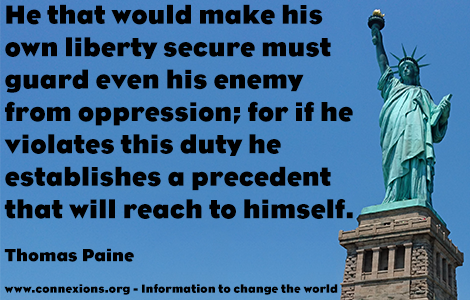
Your support is needed to keep Connexions going
All of the work of the Connexions project is done by volunteers, but our expenses include rent, phone and computer costs and technical support, as well as expenses related to our ongoing project of converting printed archival materials into digital formats. You can make a one time or regular monthly contribution through the donate page on the Connexions website.
Bequests
Many of us have made working for social justice a lifetime commitment. If you are thinking about leaving a legacy for social justice that will live on, you might want to consider leaving a bequest to Connexions in your will. If you'd like to discuss this option, please contact us or see the Bequest page.

